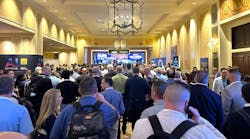On a cool, crisp autumn evening, there is no better time to gather around the campfire. But before the good times (and gooey s’mores) can begin, somebody needs to actually start the campfire. Now, it doesn’t take a boy scout to know that the way to start a campfire is to first start small. Light the tinder, then work your way up to bigger and bigger pieces of wood while carefully fanning the flames. Once you get those leaves and dried pine needles ignited, their heat will then set the little twigs ablaze, and so on and so forth. With some patience and careful planning, you can build up a nice campfire that will last the evening.
Security dealers who are looking to build a profitable fire system installation business could discover it is much like starting a good campfire. If you try to take shortcuts and don’t take the time to learn how it works, your dreams of growing profits could go from sizzle to fizzle.
When comparing the upfront profit margins of various types of security installations (fire, intrusion, access control, and video surveillance), fire actually has the smallest upfront profit margin. So why bother? The answer is simple: recurring revenue.
Know That You Don’t Know
One of the biggest mistakes that security dealer integrators make when they first start doing fire system installations is thinking it’s like installing a burglar alarm. “Probably one of the worst things you could do is being comfortable in the fact that you know how to program a security system and therefore think you know how to handle fire systems,” says Mike Madden, national sales manager, Gamewell-FCI.
He quips, it scares me when I hear someone say they have real smart installers who can handle any security system and they don’t worry about fire. “I run screaming from people like that because they really are naïve about what they are getting into,” says Madden.
Al Koenig, president, Casey’s Systems, a fire dealer in Floral Park, NY, agrees. He says that oftentimes security dealers who try to get into the fire business don’t understand the difference between burglar alarms and fire alarms.
Fire alarms are code driven, meaning national codes, local codes, city codes, and law regulation, Koenig explains. As such, according to him, you have to design the job, plan the job, file the job, then follow the plans in every way—the way it looks, the kind of wiring, the kind of conduit, the way you terminate the wire, everything—to a strict code standard.
Another problem that you could run into is bidding a project too low. “The wrong way to work up a project is when a dealer thinks you can add up the devices in the system, throw in a few hours of labor, a couple of dollars for wire and call it a day,” says Koenig. He sees this attitude in fire installs for typical small businesses, such as restaurants, bars, or night clubs, looking to install a fire system for about $5,000.
“If they got the price of the job from a real fire alarm contractor,” he continues, “the price would be $20,000.”
Koenig explains the extra expenses come from necessities like hiring a licensed professional engineer (PE), providing professional drawings on AutoCAD, paying the building and fire department a filing fee, hiring an asbestos investigator, using a UL-approved central station, the special fire wiring required and so on.
Koenig has seen underbidding a fire install ruin a dealer’s business. If a dealer who doesn’t thoroughly understand the fire business tries to go for the big installs right away, he could be in for huge problems immediately. For instance, a dealer might look at a 12-story building and figure $10,000 a floor would be pretty good and make a $120,000 bid. Koenig explains that might be a good bid for that building for burglar alarms, but for fire it might be more like $500,000. “If your company is small, that type of mistake could sink you,” he warns.
Fire Codes Are Key
While fire installs are very different from burglar alarms, Madden says that they aren’t necessarily much more difficult. However, he emphasizes a thorough understanding of the fire codes, which can be key. A fire dealer has to pay attention to national codes, such as from NFPA or IPC, as well as local codes.
He continues, “Local codes and national codes work hand in hand in terms of what governs a correct installation of a fire system—and you can never be too educated in that area.”
Madden says that he is currently fighting a battle for a dealer regarding an interpretation of the fire code. While he thinks his dealer is in the right, he says this situation could have been prevented if the dealer had gotten this sticky part of the local fire code clarified before the job ever took place. Now he’s fighting the battle after the fact.
“In security you can design and do whatever you want to do,” says Madden. “There is nothing to constrain you. You are only constrained by your imagination on how you want to approach a job. In fire, that is not true and you have to pay attention to the codes.”
Building The Business
For security dealers who are serious about getting into the fire business, Koenig recommends that they get educated about the industry and start building relationships with the key fire people in their locale.
Koenig says that the National Institute for Certification in Engineering Technologies (NICET) has fire certification classes (Level 1 through 4). “You should get at least a NICET Level 2 so you really understand fire,” adds Koenig, who also gives courses.

